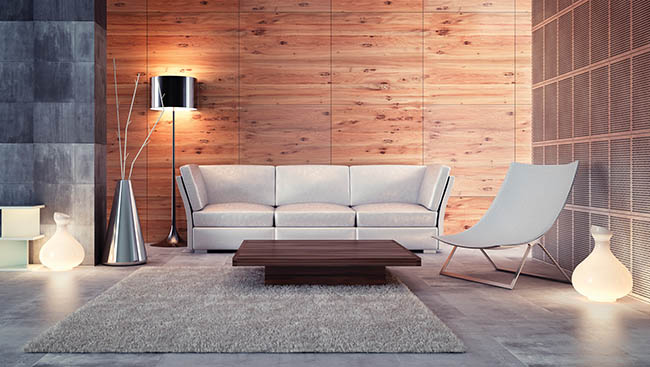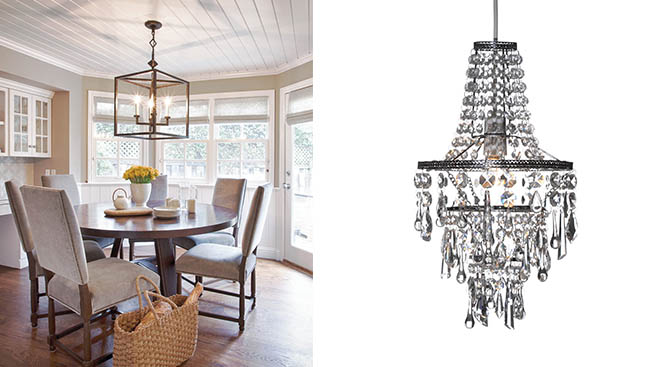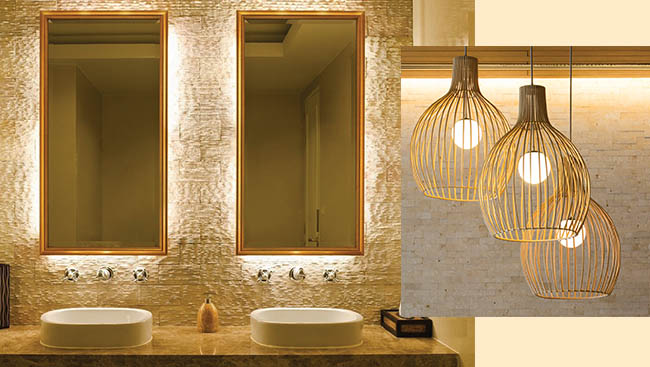Out of the darkness, comes light – but only if you know how to do it right.
Lights. You don’t notice them until you do.
The right fixture hung at the proper height, pointed in a specific direction with an appropriate wattage can make all the difference around your home. Lighting can change the mood of a room. It can provide a sense of comfort or security. It can help ease your ability to perform tasks. Before you flip the switch, take into account the many ways the right light can light up your life.
Just as you would with most other elements of your home, function will be the guiding factor in your design decisions. “You can certainly achieve both [function and design] but you have to keep function in mind most importantly,” advises Dave Leeming of Light the Store.

Ask yourself what activities occur in the room before you start sorting through lighting styles. The lighting in each room will reflect what tasks happen in each space and need to be addressed individually.
“You can easily use the same kind of lighting in all the bedrooms or use the same kind of lighting in all the bathrooms,” Leeming says. “For bathrooms, though, you might want to have something different for a powder room versus a master bathroom. Or in bedrooms, you might want to have a larger fixture for a master bedroom versus in a kids’ room.”
Living Room
Ensure all four corners of the room are lit. Combine lights that shine both up and down with a mix of table lamps and floor lamps. Provide lamps for each reading spot.
Dining Room
Use indirect lighting around the room with an overhead light directly above the table to highlight the main space where people are likely to gather and eat.

Kitchen
Focus on overhead lighting to brighten up a cooking space and consider adding under-cabinet lighting to illuminate countertops and workspaces. “We generally recommend that you put your recessed lighting right over the edge of your counters,” says Leeming, adding that one common mistake often seen is recessed lighting scattered around the centre of the room when it really should be right over the task areas.
Bedroom
Lamps or sconces should be placed by the bed but not aimed directly at it. Other overhead fixtures should be pointed away from the bed and used to illuminate a dressing area.
Bathroom
Find an overhead light that will fill the room with lightwhile using lights or sconces alongside the mirror. Depending on size, you may need a light directly over the shower.
Once you know what lighting your room will need, ask yourself several other questions before the shopping begins.
What mood do you hope to create? With careful consideration, lighting can take a room from sterile to cozy or uninviting to welcoming. Include a low-wattage lamp that gives off the allure of candlelight in your bedroom. A dining room may benefit from indirect lighting so a subtle glow keeps guests relaxed after a big meal.
Do you have artwork or a feature wall that you wish to highlight? If you’ve invested in any decorative elements that you want to emphasize, consider treating them independent of the main lighting in a room to ensure they are given the illumination they deserve.
Is your décor more contemporary? Keep the number of lamps to a minimum and consider more built-in lighting instead. Does your décor lean towards traditional? Search for pendant lights, sconces and lamps that suit your style.
If you have dark walls or finishes, consider additional lighting as they absorb more light than lighter finishes.

While installing a dimmer switch may not seem like an important upgrade, it’s a ‘must-have’ on the lists of many designers. Dimmers offer the opportunity to turn general or task lighting into ambient lighting making all lights on a dimmer a versatile option no matter the space.
Function may come first but style doesn’t have to be ignored. Lights come in an unlimited number of shapes, sizes, and styles that you’re sure to find something unique for your space.
Pendant lights have become fully customizable making them an increasingly popular choice when it comes to dramatic, sculptural or unexpected design elements. Try a dark chandelier in place of bedside lamps, vintage lamps hung about kitchen islands or group industrial lighting together above a coffee table.
Look for materials that aren’t traditionally associated with lighting such as wood, glass and wrought iron. Try fun fixtures in rooms like a powder room where your style might not shine through otherwise.
Don’t be discouraged if your guests don’t comment on any upgrades or improvements; lighting done right is rarely noticeable and that’s a good thing. A properly lit space will leave guests – and the room they’re in – looking their best and feeling comfortable; yet they likely won’t be able to pinpoint why.


